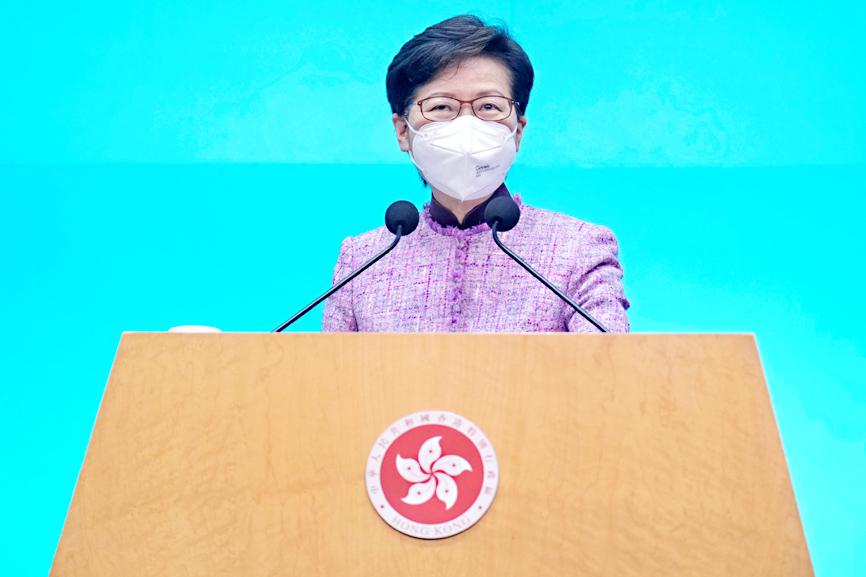Hong Kong Chief Executive Carrie Lam (林鄭月娥) yesterday announced that she would step down in June, ending a divisive term that saw democracy protests crushed and strict COVID-19 pandemic curbs plunge the territory into international isolation.
Ending months of speculation, Lam said that she would not seek a second term when a committee made up of the territory’s political elite chooses a new leader next month.
“I will complete my five-year term as chief executive on June 30, and officially conclude my 42-year career in government,” Lam told reporters.

Photo: Reuters
She said China’s leaders “understood and respected” her choice not to seek another term, and that she wanted to spend more time with her family.
The 64-year-old had dodged questions for months over her future, but yesterday said that she had informed Beijing of her plan to quit more than a year ago.
A career bureaucrat, Lam became Hong Kong’s first female leader in 2017, but she is on track to leave office with record-low approval ratings.
Kenneth Chan, (陳家洛), a political scientist at Hong Kong Baptist University, said that Lam had lost support across the political spectrum.
“Not merely among the pro-democracy citizens but also increasingly among the pro-Beijing camp as she has done such a terrible job with the pandemic,” he said.
Hong Kongers and businesses based in the territory have little clarity on who the next leader might be, at a time when Beijing is calling the shots more directly.
The chief executive position is selected by a 1,500-strong pro-Beijing committee, the equivalent of 0.02 percent of the territory’s 7.4 million population. Lam’s successor is to be chosen on May 8, but so far no one with a realistic prospect of being chosen has publicly thrown their hat into the ring.
Hong Kong Chief Secretary for Administration John Lee (李家超), who has a background in security, has been tipped by local media as the most likely contender.
Another potential candidate is Hong Kong Financial Secretary Paul Chan (陳茂波).
The new leader would take office on July 1.
The Hong Kong Democracy Council, a US-based group made up of opposition figures who fled the territory, described Lam’s administration as “disastrous.”
Lam “will just be replaced by another Chinese Communist Party puppet,” the group wrote on Twitter. “As ever, Hong Kongers want democracy.”

NEXT GENERATION: The four plants in the Central Taiwan Science Park, designated Fab 25, would consist of four 1.4-nanometer wafer manufacturing plants, TSMC said Taiwan Semiconductor Manufacturing Co (TSMC, 台積電) plans to begin construction of four new plants later this year, with the aim to officially launch production of 2-nanometer semiconductor wafers by late 2028, Central Taiwan Science Park Bureau director-general Hsu Maw-shin (許茂新) said. Hsu made the announcement at an event on Friday evening celebrating the Central Taiwan Science Park’s 22nd anniversary. The second phase of the park’s expansion would commence with the initial construction of water detention ponds and other structures aimed at soil and water conservation, Hsu said. TSMC has officially leased the land, with the Central Taiwan Science Park having handed over the

AUKUS: The Australian Ambassador to the US said his country is working with the Pentagon and he is confident that submarine issues will be resolved Australian Ambassador to the US Kevin Rudd on Friday said that if Taiwan were to fall to China’s occupation, it would unleash China’s military capacities and capabilities more broadly. He also said his country is working with the Pentagon on the US Department of Defense’s review of the AUKUS submarine project and is confident that all issues raised will be resolved. Rudd, who served as Australian prime minister from 2007 to 2010 and for three months in 2013, made the remarks at the Aspen Security Forum in Colorado and stressed the longstanding US-Australia alliance and his close relationship with the US Undersecretary

‘WORLD WAR III’: Republican Representative Marjorie Taylor Greene said the aid would inflame tensions, but her amendment was rejected 421 votes against six The US House of Representatives on Friday passed the Department of Defense Appropriations Act for fiscal 2026, which includes US$500 million for Taiwan. The bill, which totals US$831.5 billion in discretionary spending, passed in a 221-209 vote. According to the bill, the funds for Taiwan would be administered by the US Defense Security Cooperation Agency and would remain available through Sept. 30, 2027, for the Taiwan Security Cooperation Initiative. The legislation authorizes the US Secretary of Defense, with the agreement of the US Secretary of State, to use the funds to assist Taiwan in procuring defense articles and services, and military training. Republican Representative

TAIWAN IS TAIWAN: US Representative Tom Tiffany said the amendment was not controversial, as ‘Taiwan is not — nor has it ever been — part of Communist China’ The US House of Representatives on Friday passed an amendment banning the US Department of Defense from creating, buying or displaying any map that shows Taiwan as part of the People’s Republic of China (PRC). The “Honest Maps” amendment was approved in a voice vote on Friday as part of the Department of Defense Appropriations Act for the 2026 fiscal year. The amendment prohibits using any funds from the act to create, buy or display maps that show Taiwan, Kinmen, Matsu, Penghu, Wuciou (烏坵), Green Island (綠島) or Orchid Island (Lanyu, 蘭嶼) as part of the PRC. The act includes US$831.5 billion in